Digital transformation has become essential for every organization, but where do you start? How do you create a blueprint for digital transformation that encompasses your entire organization and accurately projects real business impact? That’s why ValueBlue created BlueDolphin, to help you visualize digital transformation by bringing together the workflows, data, applications, and infrastructure.
ValueBlue is committed to enabling innovation. The company name originates from the book, Blue Ocean Strategy, which describes how innovation in an existing field is so groundbreaking it results in a new field. Digital transformation requires that kind of Blue Ocean thinking, and BlueDolphin was developed as an enterprise SaaS tool to drive business transformation.
Digital transformation requires business and IT to collaborate to enable new processes and realize new efficiencies. To facilitate collaboration, you need a canvas that lets you visualize your transformation needs so IT can help you realize transformation. Rather than starting from a blank canvas, BlueDolphin has created a series of Views, so you can choose the template that best suits your business goals. Using readymade templates is more efficient, saves time, and standardizes your way of working across the organization, ensuring you adhere to industry standards and best practices.
To illustrate how to unlock the power of BlueDolphin digital transformation templates, we present a profile of some of the newest available views and how and when to use them:
Template 1: Business Model Canvas
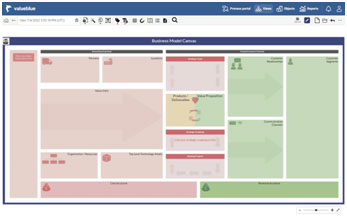 To describe your entire organization, use the Business Model Canvas (also known as the Operating Model Canvas). This template provides one simple visualization of the company for business management and stakeholders.
To describe your entire organization, use the Business Model Canvas (also known as the Operating Model Canvas). This template provides one simple visualization of the company for business management and stakeholders.
To complete this template, you start with the value stream or capabilities that contribute to delivering the value chain. Add all the related objects to the placeholders around it to describe how you plan to deliver the value chain. To provide greater detail, you can make objects that don’t fit as a placeholder clickable to reveal a related view.
Template 2: Capability Architecture
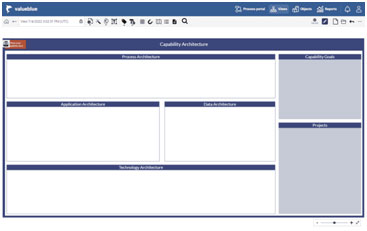 This canvas captures “Capabilities in a Box.” It allows you to map everything you need to realize a capability as a single, easy-to-follow overview you can use as a “linked view” on your central capability map.
This canvas captures “Capabilities in a Box.” It allows you to map everything you need to realize a capability as a single, easy-to-follow overview you can use as a “linked view” on your central capability map.
Drop the capability you want to design on the placeholder shown to start building your capability architecture. You can then use the diagram or Explore button to determine which objects are related to that capability.
The left side of the template lists the architectural assets needed for the capability. To create an overview of the assets, simply drag and drop processes, applications, data objects, technology assets, and their relationships.
The right side of the template explains how the capability contributes to your business goals. Below the Goals header, you can add any Projects that might affect that capability in the coming period.
Template 3: Capability Canvas
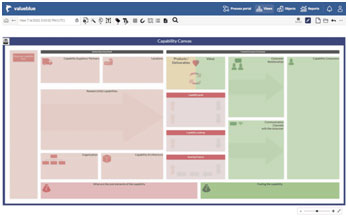 Each capability plays a unique part in making the organization run as a whole. However, within each capability there is specific data, technology, applications, and systems. Therefore, to see the larger picture, you may need to inspect each specific capability more closely. This inspection is exactly what the Capability Canvas enables. Users view a specific capability at a deeper level and can develop a business model canvas around it.
Each capability plays a unique part in making the organization run as a whole. However, within each capability there is specific data, technology, applications, and systems. Therefore, to see the larger picture, you may need to inspect each specific capability more closely. This inspection is exactly what the Capability Canvas enables. Users view a specific capability at a deeper level and can develop a business model canvas around it.
Templates 4 – 8: Project Design
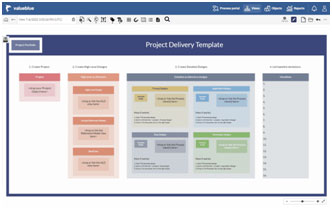 We have added five new templates to facilitate project design:
We have added five new templates to facilitate project design:
The Project Delivery template makes it easy to centralize all the information related to a specific project. It also standardizes project design delivery, so each project follows the same workflows. You start by adding a work project or object, then add links to High-Level Design, Domain Reference Models, and Blueprints to share project information.
Once you have completed the Project Delivery template, you can apply the templates for Project Process Design, Project Application Design, Project Data Design, and Project Technology Design. These templates allow you to map design details, including placeholders for policies and principles, current state designs, and reference models. Once the detailed design templates are complete, they are linked to the Project Delivery template to give you a consolidated view of the project and all its dependencies. You can also add policies that deviate from the policies and principles on the right.
Template 9: C4 Methodology Project Governance
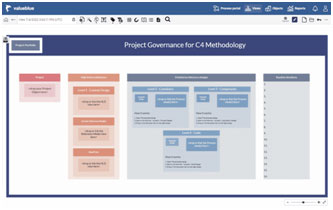 The C4 modeling approach has been gaining popularity in application development and is ideal if you want a more detailed, technical approach. You can quickly deconstruct your high-level application design into code components. There are relevant placeholders, so you simply drop the designs in the right place.
The C4 modeling approach has been gaining popularity in application development and is ideal if you want a more detailed, technical approach. You can quickly deconstruct your high-level application design into code components. There are relevant placeholders, so you simply drop the designs in the right place.
Template 10: Customer Journey Map
 The Customer Journey Map helps you understand customers’ behavior and how they interact with your brand. The template gives you a drag-and-drop interface to map assets to the customer journey. Placeholders provide details about channels, key metrics, responses, and opportunities. The template can be customized using texts, objects, and icons.
The Customer Journey Map helps you understand customers’ behavior and how they interact with your brand. The template gives you a drag-and-drop interface to map assets to the customer journey. Placeholders provide details about channels, key metrics, responses, and opportunities. The template can be customized using texts, objects, and icons.
Template 11: Team Canvas
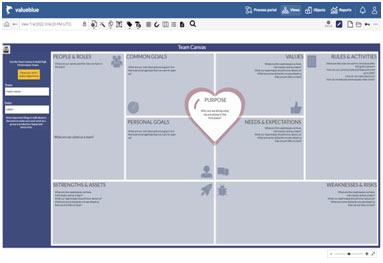 Projects require people, and the Team Canvas can map your team’s purpose, goals, values, needs and expectations, and even personal goals. The template can be populated using text and free shapes. It can be the ideal tool when brainstorming a new goal or direction.
Projects require people, and the Team Canvas can map your team’s purpose, goals, values, needs and expectations, and even personal goals. The template can be populated using text and free shapes. It can be the ideal tool when brainstorming a new goal or direction.
Digital transformation is never easy or simple, but the right roadmap can expedite the process. With the new BlueDolphin digital transformation templates, you can map out transformation strategies, develop tactics, allocate assets, and develop the right teams. ValueBlue can help you with your business transformation strategy. Let BlueDolphin show you the way.
About: Wilko Visser is an entrepreneur and CEO of ValueBlue. He specializes in developing high-quality and high-impact B2B products for large organizations and enterprises. Wilko builds teams that achieve international results through effective collaboration and is passionate to build a community with satisfied and involved customers.












